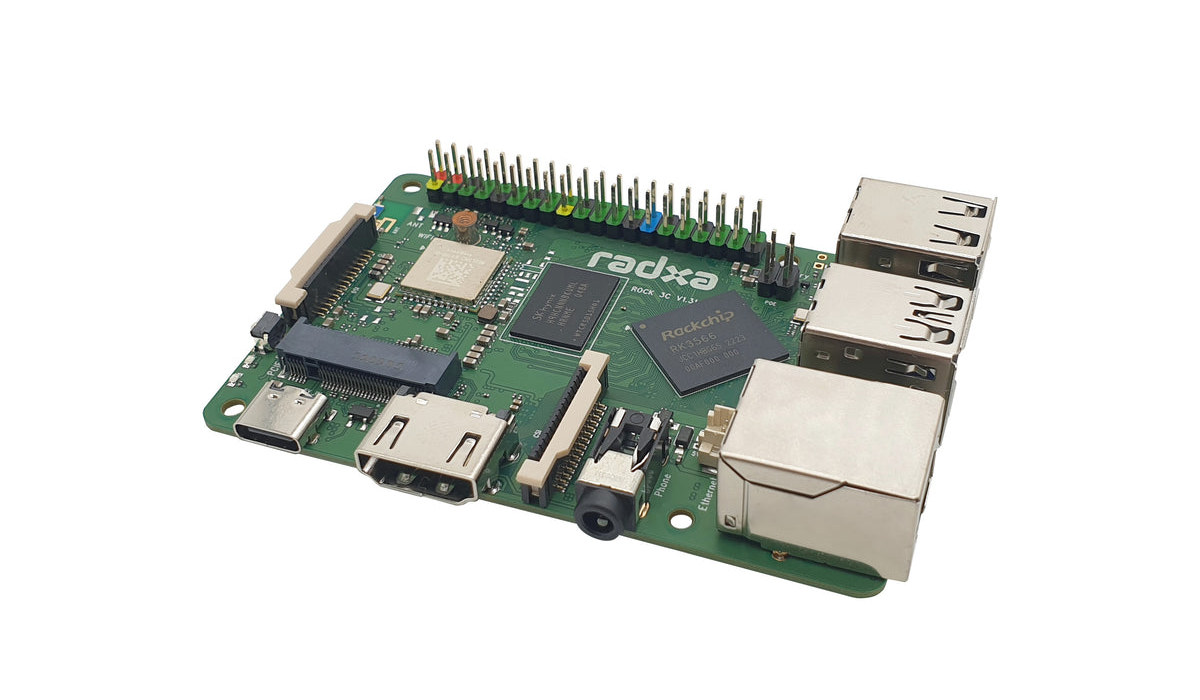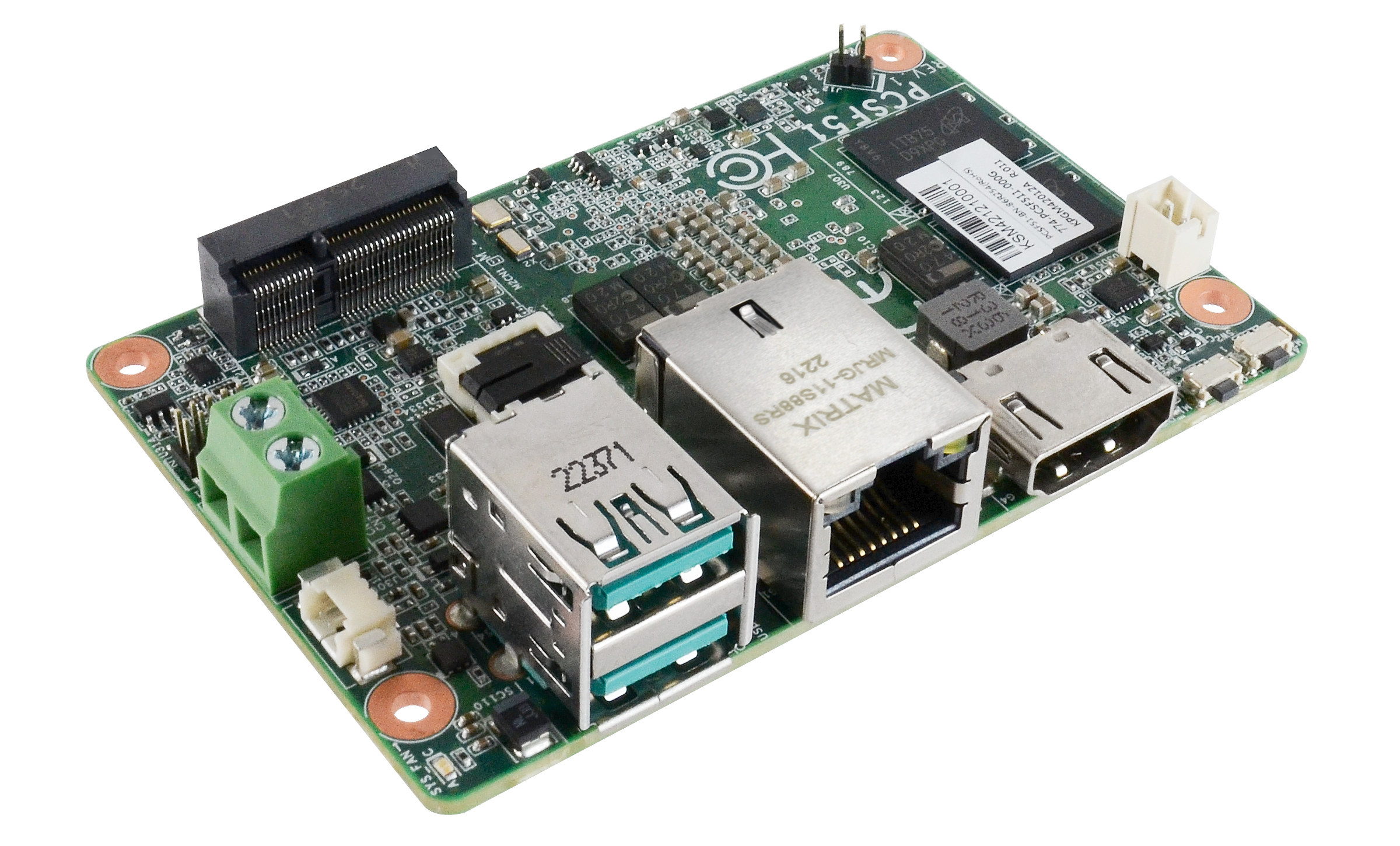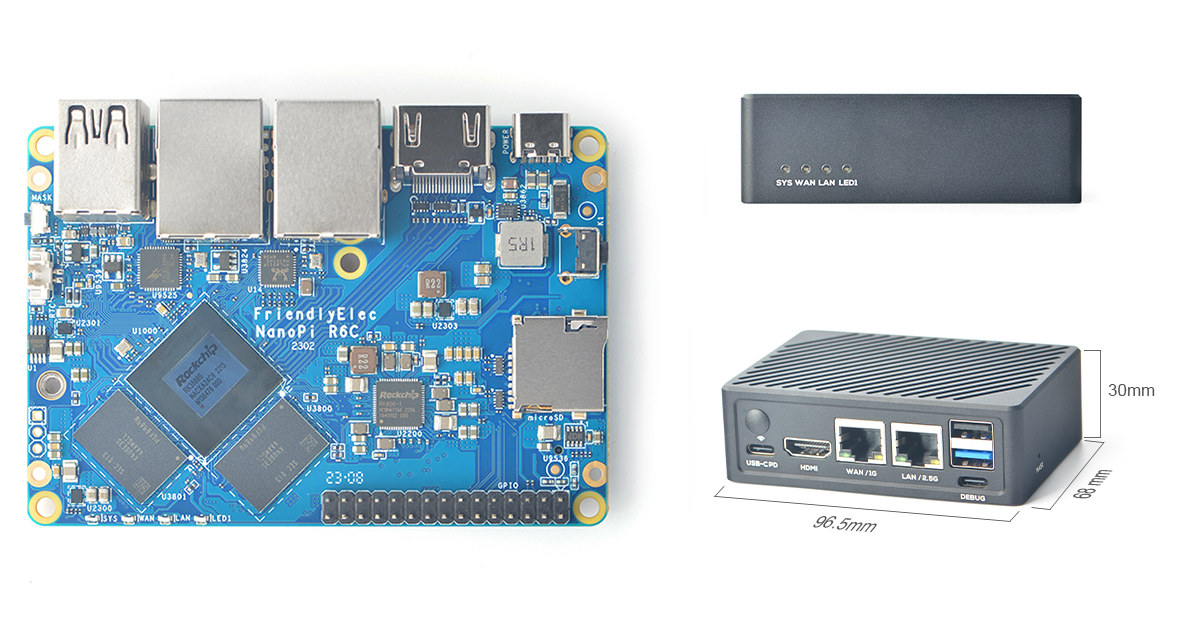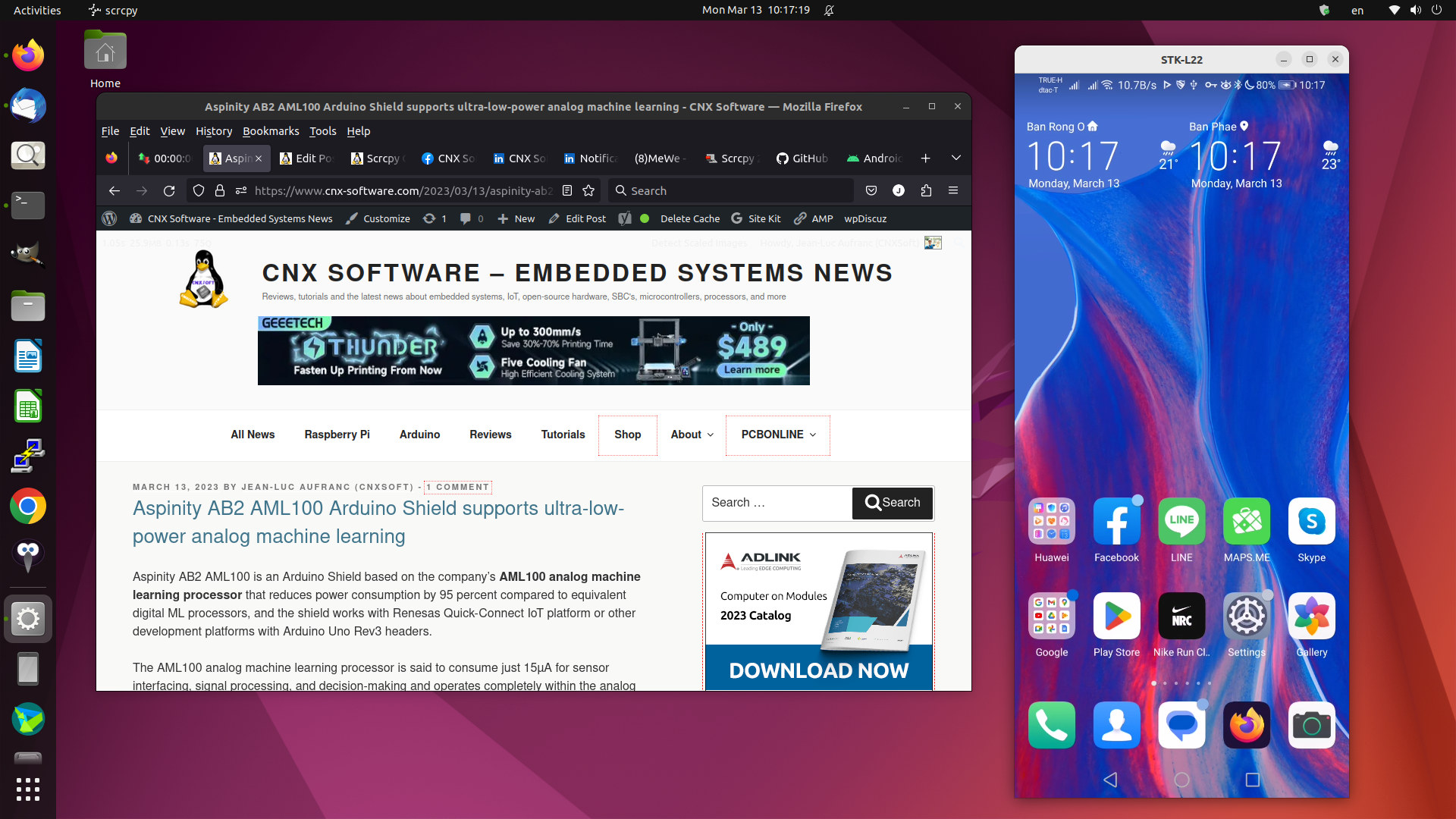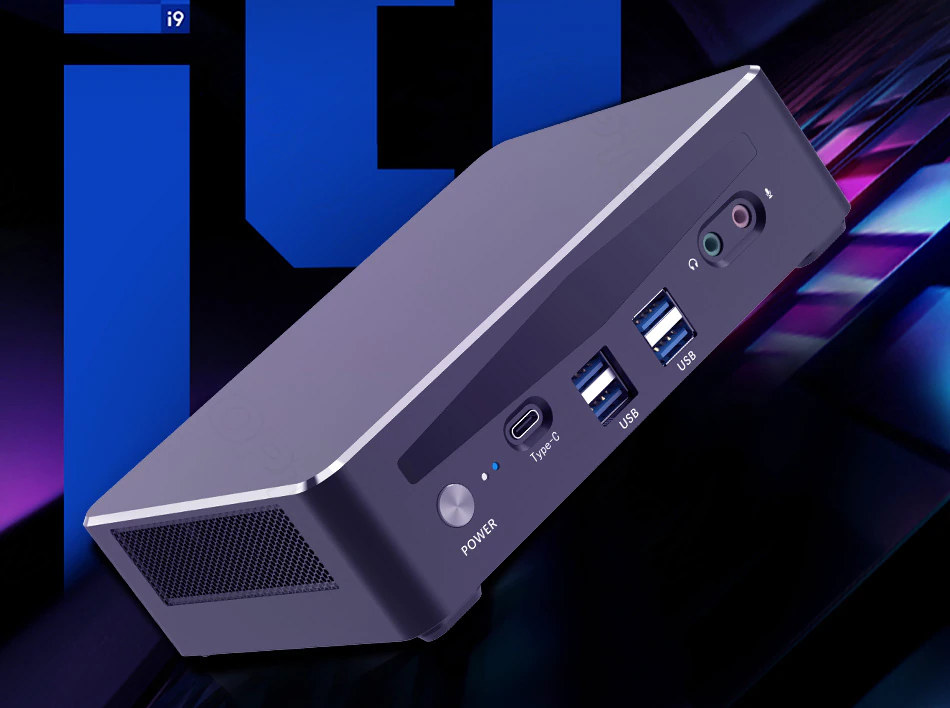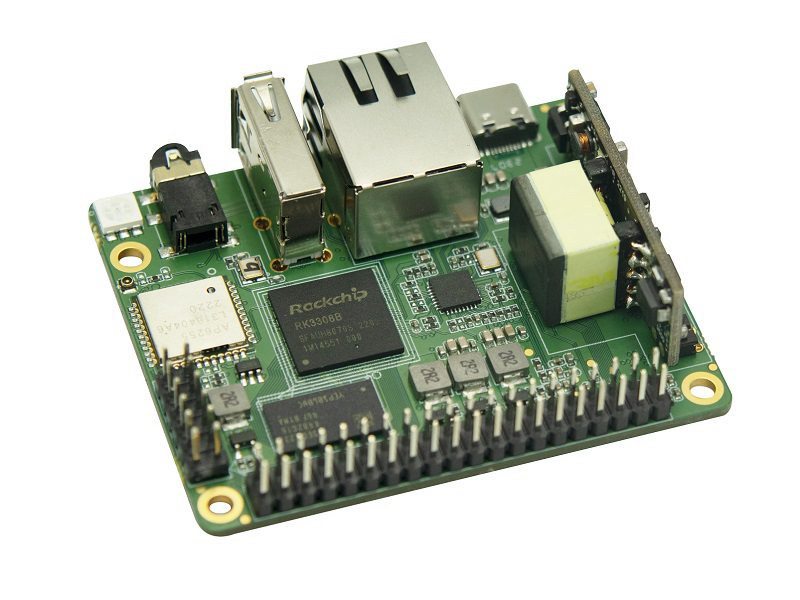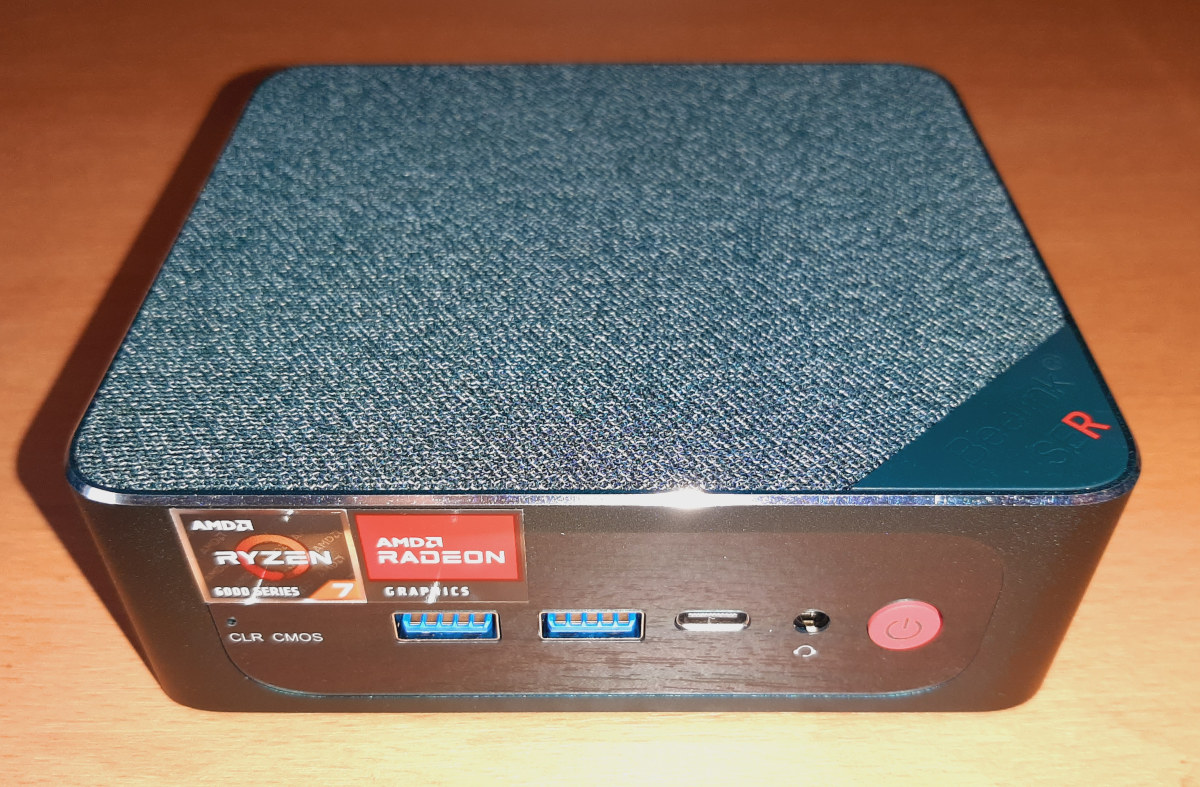Radxa ROCK 3C, also called ROCK 3 Model C, is a Rockchip RK3566-T Arm SBC with up to 8GB RAM and WiFi 5. It mostly follows the Raspberry Pi 3 Model B form factor, but also adds an M.2 PCIe socket for NVMe SSDs. The single board computer also comes with a MicroSD card slot and eMMC flash module socket to boot the OS, a 4Kp60 capable HDMI 2.0 port, a MIPI DSI connector, a MIPI CSI camera connector, a 3.5mm jack with microphone, four USB ports, Gigabit Ethernet, and a 40-pin color-coded GPIO header. ROCK 3C specifications: SoC – Rockchip RK3566-T quad-core Cortex-A55 processor @ 1.6 GHz with Arm Mali-G52 GPU, 0.8 TOPS NPU (AI accelerator) System Memory – 1GB, 2GB, 4GB, or 8GB LPDDR4 2112MT/s Storage MicroSD card slot eMMC module socket M.2 Key-M PCIe socket for 2230 NVMe SSD Video Output HDMI 2.0 up to 4Kp60 2-lane […]
DFI PCSF51 – An 1.8-inch industrial SBC with AMD Ryzen R2000 processor
DFI PCSF51 is a 1.8-inch single board computer (SBC) powered by an AMD Ryzen Embedded R2000 processor with up to 8GB DDR4 memory and 128GB eMMC flash designed for space-constraints industrial applications, robotics, edge computing, AI vision systems, and more. The business card-sized board comes with HDMI 1.4 video output, Gigabit Ethernet networking, two USB 3.2 Gen 1 ports, and an M.2 Key-E socket for wireless expansion, as well as eight digital I/Os. Other features include a watchdog and an RTC, and the SBC takes 12V DC input on a 2-pin terminal block. DFI PCSF51 specifications: AMD Ryzen Embedded R2000 SoC (one or the other) AMD Ryzen Embedded R2514 quad-core processor @ 2.1/3.7 GHz (Turbo) with 2MB Cache, 8 CU AMD Vega GPU; 12W TDP AMD Ryzen Embedded R2314, quad-core processor @ 2.1/3.5 GHz (Turbo) with 2MB Cache, 6 CU AMD Vega GPU; 12W TDP AMD Ryzen Embedded R2312 […]
$85+ NanoPi R6C 2.5GbE router and SBC gets M.2 NVMe SSD socket
FriendlyElec has come up with a low-cost version of the NanoPi R6S with the NanoPi R6C router/SBC based on the same Rockchip RK3588S octa-core Cortex-A76/A55 processor but offering just one Gigabit Ethernet port and one 2.5GbE port, and adding an M.2 NVMe SSD socket for storage. The NanoPi R6C is also offered with 4GB or 8GB RAM, an optional 32GB eMMC flash soldered on the board, a Micro SD card socket, an 8K capable HDMI 2.1, USB 3.0 and USB 2.0 ports, and a few extra features we’ll discuss further below. NanoPi R6C specifications: SoC – Rockchip RK3588S octa-core processor with: CPU – 4x Cortex-A76 cores @ up to 2.4 GHz, four Cortex-A55 cores @ 1.8 GHz GPU – Arm Mali-G610 MP4 quad-core GPU with OpenGL ES3.2 / OpenCL 2.2 / Vulkan1.1 support VPU – 8Kp60 H.265/VP9/AVS2 video decoder, 8Kp30 H.264 decoder, 4Kp60 AV1 decoder, 8Kp30 H.265/H.264 video encoder AI […]
Scrcpy 2.0 Android screen mirroring and control utility for PCs released with audio forwarding support
Scrcpy 2.0 Android screen mirroring and control utility for Windows, Linux, and macOS has just been released with support for audio forwarding that enables audio to be played back into the computer/laptop, instead of the smartphone, at least for mobile devices running Android 11 or greater. We first reported about Scrcpy open-source utility in 2018, and at the time, it worked relatively well in Ubuntu 16.04 but required quite a few steps for the installation, and it would lag from time to time. I could still use the mouse and keyboard to control my phone, send SMS, chat, browse the web, play games, switch between landscape and portrait modes, and so on. Five years later, Scrcpy 2.0 has been released, the installation is much easier, and new features have been implemented. Scrcpy 2.0 highlights: Quality – 1920×1080 or above Performance – 30~120fps, depending on the device Latency – 35~70ms Startup […]
V600 Alder Lake Mini PC features Thunderbolt 4 port, dual 2.5GbE, up to Core i9-12900H CPU
V600 mini PC is equipped with an Alder Lake processor from Core i5-1240P up to a Core i9-12900H, up to 64GB RAM, and high-speed interfaces such as Thunderbolt 4 and dual 2.5GbE networking. The mini PC also comes with two M.2 NVMe sockets, one PCIe Gen 4, one Gen 3, and support for SATA drives up to 7mm thick, offers three 4K-capable video outputs with HDMI and DisplayPort video interfaces, and several other USB 3.2/2.0 ports. V600 specifications: Alder Lake-P/H SoC (one or the other) Intel Core i7-1260P 4P+8E (16 threads) processor @ 3.40/4.70GHz with Intel Xe graphics; 28W PBP Intel Core i5-1240P 4P+8E (16 threads) processor @ 3.30/4.40GHz with Intel Xe graphics; 28W PBP Intel Core i7-12700H 6P+8E (20 threads) processor @ 3.5 /4.7 GHz with 96EU Intel Xe graphics; 45W PBP Intel Core i9-12900H 6P+8E (20 threads) processor @ 3.8/5.0 GHz with 96EU Intel Xe graphics; 45W PBP […]
Banana BPI-P2 Pro headless SBC features RK3308 CPU, PoE Ethernet, WiFi 5, audio jack
Banana Pi BPI-P2 Pro is Rockchip RK3308 quad-core Cortex-A35 SBC for headless applications with a PoE-capable Ethernet port, WiFi 5, a USB port, an audio jack, and two GPIO headers for expansion. You may think the Banana Pi guys have gone crazy by calling such entry-level level SBC “Pro”, but that’s because the company previously released the BPI-P2 Zero and BPI-P2 Maker single board computers based on Allwinner H2+ quad-core Cortex-A7 processor, so the BPI-P2 Pro is indeed an improvement albeit with some caveats. Banana Pi BPI-P2 Pro specifications: SoC – Rockchip RK3308 quad-core Arm Cortex-A35 processor @ up to 1.3 GHz with built-in VAD (Voice Activity Detector) System Memory – 2GB LPDDR2 SDRAM [Update: According to Rockchip RK3308 specifications, the maximum memory capacity is 512MB, so Banana Pi may have meant 2 Gbit instead, meaning 256MB of RAM]. Storage – 8GB eMMC flash, microSD card slot Video Output – […]
RAKwireless programmable 5G & LoRaWAN small cell device runs Ubuntu on Raspberry Pi CM4
RAKwireless “All-in-One 5G” is a programmable 64-bit Ubuntu indoor device that integrates AGW (access gateway) through a Raspberry Pi CM4 as well as 5G and 4G LTE cellular and LoRaWAN connectivity. The device is powered through its 2.5GbE PoE++ port and designed for private 5G networks for industrial automation, public safety, and transportation, and RAKwireless says you can also “start earning cryptocurrency by providing LTE cellular and LoRa coverage”, but I could not find details about monetization at this time. RAKwireless “All-in-One 5G” specifications: SoM (AGW) – Raspberry Pi CM4 system-on-module with Broadcom BCM2711 quad-core Cortex-A72 processor with 4GB RAM and 32 eMMC flash, WiFi 5 and Bluetooth 5.0 connectivity 5G/4G cellular connectivity LTE Mode- TDD Frequency Bands – Band 48 (3550 MHz to 3700 MHz); band N78 is also supported for global coverage Channel Bandwidth5/10/15/20 MHz Max TX Power – 24 dBm Receiver Sensitivity – -100 dBm Built-in 2-port […]
Beelink SER6 Pro mini PC review – Windows 11, Ubuntu 22.04, and USB4
Beelink upgraded their earlier SER6, which used an AMD Ryzen 5 6600H processor with integrated AMD Radeon 660M graphics, and released the SER6 Pro which has a faster AMD Ryzen 7 6800H processor with much more powerful integrated AMD Radeon 680M graphics. Beelink kindly sent a SER6 Pro unit for review however since receiving the mini PC, Beelink have ‘refreshed’ the processor to use an AMD Ryzen 7 7735H also with AMD Radeon 680M graphics, and called it the SER6 Pro Refresh. As a result, this review looks at Windows performance which should be indicative for both versions, together with a quick look at running Ubuntu and also a more detailed look at the USB4 port which is a new inclusion to Beelink’s mini PCs. Update: you may be interested in the review of the Beelink SER6 Pro 7735HS – in Windows 11 only – as we’ve also received it […]


